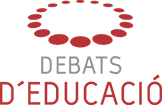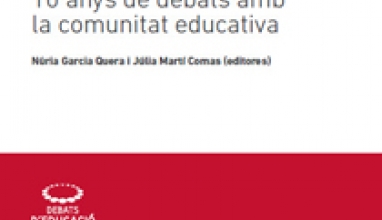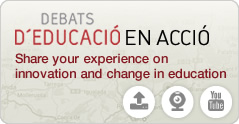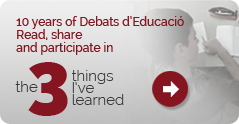- Català
- Español
- English
You are here
Envisaging the future of education. 10 years of debates with the educational community
About the speaker
Núria García Quera and Júlia Martí Comas
Editors
This book contains the reflections of internationally renowned experts from the world of education on the role of education in the knowledge society, a constantly changing society marked by globalization and new technologies. What needs to be taught? How should it be taught? What is the function of education? Education to cover the real needs of the production system? Education for a more cohesive society? Education to produce free individuals? Education to give everyone opportunities? What administrative model needs to be applied?
These are the speakers at the forty-nine Debates on Education over the last ten years whose knowledge, experience and reflections on education are now collected in this book: Juan Tedesco, Manuel Castells, Javier Elzo, Xavier Bonal, Ferran Ferrer, Miquel Angel Essomba, Celia Braslavsky, Jorge Wagensberg, Christian Laval, Joan Coscubiela, Martin Carnoy, Cristovam Buarque, Alain Touraine, Andreas Schleicher, Maria Nieves Tapia, Reijo Laukkanen, Peggy Levitt, Salvador Cardús, Jordi Pujol, Agnès van Zanten, César Coll, Marcelo Suárez Orozco, Carola Suárez Orozco, Zygmunt Bauman, Daniel Pennac, Alvaro Marchesi, Miquel Martínez, Francesc Pedró, Mats Ekholm, Vincent Dupriez, Robert Castel, David Hopkins, Julio Carabaña, Larry Cuban, Roser Salavert, Daniel Innerarity, Ramon Farré, Ramon Plandiura, Jaap Dronkers, François Dubet, Gary Orfield, Cristóbal Cobo, Jean-Yves Rochex, Isabel Solé, José Antonio Marina, Éric Debarbieux, David Istance, Robert B. Kozma, Yong Zhao, Richard Gerver, John MacBeath, Henry M. Levin and Annie Kidder.
The book also contains the contributions and proposals for the future from the educational community that have been collected in the 3 things I've learned forum organized to celebrate the tenth anniversary of Debates on Education.
The current context. The situation has changed and we haven't had time to change schools.
Globalization, the knowledge economy, individualism, infoxication, cultural diversity. Education has a key role to play in this complex, unstable and postmodern world where inequality is on the rise and change takes place at breakneck speed. Education is a motor for the economy, but it also has to face up to the challenge of working for the creation of value and social cohesion.
Marina: "The issue right now, what concerns all nations, all businesspeople, all politicians, and what should concern all citizens is: how can we generate talent? In a knowledge society, with an economy that is increasingly based on science and technology, a nation's greatest treasure is no longer its territory, or population, or raw materials, or capital, but its TALENT." Page 16
Elzo set a series of priorities that need to be transmitted through education: "Rationality, personal skills, active tolerance, solidarity, spirituality and, the culmination of all this, a utopia for a better society." Page 22
Accumulation of knowledge is no longer important, instead we need to know how to manage this knowledge and create new knowledge. Education has to teach us how to do this.
Elzo: "The younger generations know how to receive and react emotionally (they like it or they don't like it), but they find it harder to produce rational hierarchies (through an exercise of intellectual reasoning) differentiating right from wrong, the primordial from the secondary, the essential from the accessory, the data from its interpretation."Page 26
A new way of understanding 21st-century education
"Schools have to prepare students for jobs that have not yet been created, technologies that have not yet been invented and problems that we don't yet know will arise." (Schleicher, 2010, in Zhao). Page 35
"What is crucial is the ability to respond flexibly to complex problems, communicate effectively, to manage information, to work in teams, to use technology, and to produce new knowledge, skills that are known as 21st-century skills." (Kozma). Page 35
In the opinion of the speakers, the new reality means that education has to train students in skills and knowledge management. They have to become knowledge creators. Everyone has to have the chance to develop their talent, creativity and enterprise. Technology has a key role to play, as do reading skills, by which we mean the ability to read in-depth and with a critical eye. And the syllabus has to be more applicable and functional. What students know is no longer as important as what they are able to do with what they know.
Innerarity: "They can be summarized into five basic skills: 1) managing attention, 2) annihilating information, 3) simplifying the world through cooperation, 4) being yourself and 5) being brief." Page 41
This new paradigm means, for some of the authors, the need to face up to a number of challenges: maintaining the democracy of knowledge, promoting education in values, understanding education as integration and fostering cohesion.
And how can we achieve all this?
Dubet: "We have gone from Locke's model, where the child is seen as a blank page on which society writes a text, to Rousseau's, where the child is a plant that we have to help grow in accordance with their own nature." Page 59
The authors favour personalized learning to make the most of each individual's potential. Effort is more important than aptitude, and skills are worked on to achieve specific aims and reinforced through recognition of success. Teachers have to guide. Education has to be an irresistible and motivational experience.
"Only a generation that is relaxed enough to be itself and secure enough to question the conventions, to take on risks and dare to be different will find the solutions needed to progress positively towards the 22nd century." (Gerver). Page 67
"Education's worst enemy is offering concepts that are complete and closed rather than transmitting the need to keep on finding out more. Education means awakening curiosity." (Wagensberg). Page 69
Diversity and multiculturalism are factors that have to be taken into account in this new educational paradigm. They are elements that can become obstacles and lead to segregation or they can be enriching. It all depends on how they are dealt with. The authors encourage inclusion of diversity because schools have to reflect society and be varied, but they need to do so with the tools needed to be able to offer tailored attention to this diversity. With regard to multiculturalism, the trends are leading to rejecting segregation and making the most of the potential of a bicultural student body.
Education has to go beyond the school walls: lifelong learning, whether formal or not, is vital. An example of this is the Children's University. Schools face the challenge of innovating, opening up to society and interacting with their environment – of taking risks.
"If we want our children to be more creative, more innovative, to take more risks, then teachers have to be the first people to leave their comfort zone. And it is them who have to change. We cannot expect children to change if our teachers are not ready to change. [...] Because too often we don't do things because we don't want to take risks."(Gerver). Page 90
And all this is accompanied by technology, which has to support innovation and the paradigm shift, not simply acting as a tool to continue doing the same things more conveniently.
"The interactive, productive capabilities of ICT allow both teachers and students to engage in collaborative projects and investigations and generate their own knowledge products. The networking capability of ICT allows both teachers and students to work with distant collaborators, participate in knowledge building communities, and access outside mentors, experts, scientists, and business people. In addition, knowledge resources and productive capabilities are available on an 'anywhere, anytime' basis, inside and outside the school." (Kozma) Page 92
A new way to administer the education system
One of the challenges is how to offer the right to choose a school while maintaining non-segregation and educational equality. The authors alert us to the trend towards merchandization of education and schools competing to attract students/customers. But we are running the risk that part of society will not have the same opportunities to choose due to lack of knowledge or resources. Another risk is the stigmatization of certain schools due to their setting. The system needs to continue to debate how to overcome segregation. One example are "magnet" schools, schools that have been stigmatized, but which now offer different elements that regular schools do not.
A second challenge is funding. The trend is to look for private funding or to manage public funding with private-sector criteria for efficiency and results. Again this trend could lead to a contradiction with equal opportunities for education.
"The arguments in favour of this system are increased efficiency in the use of resources and equality in education through market competition and a better fit between students' needs and a school's strengths. However, its critics say that the system leads to greater segregation of students by race and social class and there is a lack of evidence of the educational benefits." (Levin). Page 115
The third challenge in administration of education is the design of pathways. Again the model that fosters individual aptitudes and establishes levels of pathway comes up against the inclusive model that standardizes and offers greater value to society. The authors advocate for the inclusive model, but are concerned for diversity and the need to provide the resources to make this possible. Pathways that segregate lead to victimization and failure.
"PISA suggests that countries with less stratified systems tend to achieve not only an above-average overall performance, but also a significantly better exploitation of the performance potential, especially for students from disadvantaged social backgrounds." (Schleicher). Page 120
And how can teachers face up to all these changes and conditioning factors?
"For teachers, coming to terms with the changing world of childhood means addressing the conjunction between what is happening in the economic world, in the social world, in family, street and peer groups and what takes place in the classroom. A transmission model (those who know telling those who do not know) is increasingly limited in effect and needs to be complemented by imaginative and stimulating pedagogies which match, and perhaps even go beyond, what interactive technologies can offer." (MacBeath).
The trend is for teachers to feel unmotivated and underrated, and that they lack the tools to face up to the changing environment. Networked collaboration, promoting research, leadership of head teachers, autonomy of schools and economic incentives in the most difficult cases are some of the proposals from the speakers.
In the words of Marchesi "schools have to be able to search, select and contract, as a external services system, the teaching profiles they need depending on their particular educational project. This provides flexibility and allows for much faster handling of problems. [...] Management teams have to be able to establish training mechanisms for their teaching staff, and they have to have the resources and systems to be able to let their teachers undertake training and research. It is the school that must detect the actual needs. Strengthening autonomy with supervision from the administration." Page 132
However, decentralization and autonomy of schools can again lead to inequality. This is where assessments are important in order to guarantee equality.
"Many of the high-performing PISA countries provide clearly formulated educational goals and standards, but have become less prescriptive in terms of how teachers should translate these goals into practice. Rather, they put the emphasis on creating a 'knowledge rich' education system, in which teachers and school principals act as partners and have the authority to act, the necessary information to do so, and access to effective support systems to assist them in implementing change." (Schleicher). Page 143
The educational community gives its opinion: what are the key issues?
Critical spirit. Working on emotions. Learning for life, with experiential learning, where learning makes sense and represents a challenge. New ways of educating that do not lead to fragmentation of knowledge. Communication as a key aspect in education. Teachers encouraging teamwork, research and learning and making this possible by providing the resources needed and increasing society's appreciation of the profession. These are the main points highlighted by the people contributing to "3 things I've learned".
Carme Barba Corominas, teacher: "Observing, reflecting, debating, listening closely to the arguments put forward by others, formulating hypotheses and knowing how to assess the information they are constantly receiving, these are the strategies that our boys and girls urgently need." Page 164
Oriol Castellví i Estruch, head and music teacher: "We now know that no child can learn if they don't feel happy and at peace. Words like self-esteem, security, critical spirit or tolerance of frustration are key aspects in children's development." Page 167
Jordi Doménech Casal, secondary school teacher and teacher trainer: "What we teach shouldn't attempt to substitute students' common sense, it should look to strengthen it." Page 172
Maite Górriz Farré, mathematics teacher: "You learn mathematics by walking, singing, writing, climbing, thinking, in short, working in the context of our environment." Page 175
Roser Argemí Relat, project lead at the Jaume Bofill Foundation: "We know that when a student can explain what they've learned, it means that they have interiorized that learning. So, it is vital that primary and secondary schools (yes, yes, secondary too) base day-to-day activities in classrooms on communicative learning processes." Page 179
Discover
other ideas
-

Conference
Debats d'Educació
2014 -

How can we build an engaged educational community?...
Valerie Hannon
2014 -

Social Open Learning: Can Online Social Networks T...
Philipp Schmidt
2014







 The texts published on this website are, unless otherwise indicated, covered by the Creative Commons Spain Attribution - Non Commercial - No Derivs 3.0 licence. You may copy, distribute and transmit the work, provided you attribute it (authorship, journal name, publisher) in the manner specified by the author(s) or licensor(s). You may not use the material for commercial purposes. You may not transmit any derivative work from this material. The full text of the licence can be consulted here:
The texts published on this website are, unless otherwise indicated, covered by the Creative Commons Spain Attribution - Non Commercial - No Derivs 3.0 licence. You may copy, distribute and transmit the work, provided you attribute it (authorship, journal name, publisher) in the manner specified by the author(s) or licensor(s). You may not use the material for commercial purposes. You may not transmit any derivative work from this material. The full text of the licence can be consulted here: